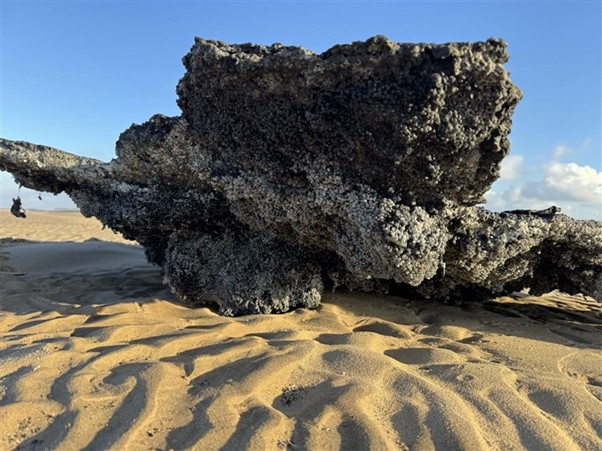Wildlife groups say they are “deeply concerned” about pollution which is washing up on beaches following the collision between a tanker and a container ship in the North Sea.
An oil tanker and a cargo ship collided in the North Sea off the UK coast on Monday 10 March, triggering a major rescue mission. UK authorities launched lifeboats and firefighting vessels to the scene some 10 nautical miles out from the city of Hull after an alarm was sounded.
The Solong cargo ship after it collided with an oil tanker in the North Sea. Photo: EPA-EFE/REX/SHUTTERSTOCK
Now the RSPB have said that plastic nurdles are washing up along miles of the Norfolk coast, including RSPB Titchwell reserve. These tiny plastic pellets found washed up on England’s east coast are likely to have come from a collision involving a tanker and a cargo ship a week ago, the coastguard has said.
In a statement on X, the wildlife charity RSPB said of the small pellets ‘some are loose, others are clumped, charred, and smelling of kerosene. We believe they are from last week’s North Sea collision.
This area is internationally important for wildlife. A crucial migration route, vital feeding ground for seabirds, and soon a nesting site for rare birds. We have just days to act before tides wash this pollution back into the sea and food chain. The RSPB is in touch with authorities, and an emergency response is underway.’
Chief coastguard Paddy O’Callaghan said they were told there had been a sighting in waters off the Wash of a “sheen that we now know to be plastic nurdles” and a team was clearing them. Nurdles are balls of plastic resin used in plastics production. They are not toxic but can present a risk to wildlife if ingested, according to HM Coastguard.
Mr O’Callaghan said aerial surveillance had confirmed the presence of the nurdles in the water and some on the shore between Old Hunstanton and Wells-next-the-Sea in Norfolk. Retrieval had started, with specialist counter-pollution teams sent to help, he added.
A photo of plastic pellets on the shoreline at Titchwell Marsh in King’s Lynn, Norfolk, following the collision in the North Sea. Photo: RSPB/PA
Ship captain charged over collision
Filipino national Mark Angelo Pernia, 38, was named by the Crown Prosecution Service as the crew member who was missing and presumed dead.
Vladimir Motin, captain of the Solong, appeared at Hull Magistrates’ Court on Saturday charged with gross negligence manslaughter and was remanded in custody to appear before the Central Criminal Court in London on 14 April.
The Coastguard said previously that 36 people had been rescued and taken safely to shore.
A “real race against time”
Steve Rowland, RSPB area manager, said pellets the size of lentils were washing up along miles of Norfolk coast, including the charity’s reserve at Titchwell.
“Some are loose and some are clumped together, they are charred and smell of kerosene. We believe they are from last week’s tragic ship collision in the North Sea,” he said.
He said: “This whole area, part of our East Coast Wetlands, is internationally important for birds and wildlife.
“It’s a crucial migration route at this time of year, a vital feeding place for seabirds, and soon the nesting site for rare and threatened terns and wading birds.
“Currently the pollution is on the tideline, but we only have a few days to get this off the beaches before rising tides disperse the debris and it is washed back into the sea and into the food chain.”
“This is a real race against time – we’ve got about seven days before the tides change,” he added.
‘Plastic nurdles are washing up along miles of the Norfolk coast, including RSPB Titchwell. This area is vital for migrating & nesting birds. We have just days to act before this pollution spreads further’, the RSPB said on X.
Plastic pellets on the shoreline at RSPB Titchwell Marsh in King’s Lynn, Norfolk, following the collision between a tanker and a container ship in the North Sea (RSPB/PA)
Calum Duncan, head of policy and advocacy at the Marine Conservation Society, said: “We’re deeply concerned about nurdles washing up along the Wash, a vital internationally important protected area for birds like waders, wildfowl, gulls and terns.
“These tiny plastic pellets, used in manufacturing countless plastic products, pose a significant threat to marine life.
“Fish and seabirds could mistake them for food, leading to starvation and serious health issues.”
In a joint statement, Lincolnshire Wildlife Trust and Norfolk Wildlife Trust said they were “very concerned” about the pollution.
“Unfortunately, the risks posed by nurdles increase when other pollutants become stuck to them,” Tammy Smalley, of the Lincolnshire trust, said.
“We urge members of the public to report nurdle sightings but to avoid touching them as they may have toxic pollutants stuck to them.”
Hugo Tagholm, executive director of Oceana UK, said the pellets can be trapped in the stomachs of wildlife and stop them eating real food, leading to starvation.
Mr Tagholm said: “Worryingly, it’s nearly impossible to remove these pellets from the ocean once they have entered it, and they can become more and more toxic as they break down into smaller and smaller pieces.”


